(!)Due to Microsoft's end of support for Internet Explorer 11 on 15/06/2022, this site does not support the recommended environment.
68.800 Stock items for Same Day Shipping
68.800 Item Stok untuk Pengiriman di Hari yang Sama
Search by Category / Brand
Pencarian dengan
Kategori / Merek
Search by Category Pencarian dengan Kategori
- Automation Components
A wide variety of standard and configurable components for factory automation engineers in industries such as automotive, semiconductor, packaging, medical and many more.
- Linear Motion
- Rotary Motion
- Connecting Parts
- Rotary Power Transmission
- Motors
- Conveyors & Material Handling
- Locating, Positioning, Jigs & Fixtures
- Inspection
- Sensors, Switches
- Pneumatics, Hydraulics
- Vacuum Components
- Hydraulic Equipment
- Discharging / Painting Devices
- Pipe, Tubes, Hoses & Fittings
- Modules, Units
- Heaters, Temperature Control
- Framing & Support
- Casters, Leveling Mounts, Posts
- Doors, Cabinet Hardware
- Springs, Shock Absorbers
- Adjusting, Fastening, Magnets
- Antivibration, Soundproofing Materials, Safety Products
- Fasteners
A good selection of accessories such as screws, bolts, washers and nuts that you may need for your daily engineering usage.
- Materials
Browse industrial materials ranging from heat insulating plates, sponges, to metal and plastic materials in different sizes to meet your various applications.
- Wiring Components
A wide variety of wiring parts for connecting and protecting control and PC parts including Connectors, Cables, Electric Wires, Crimping Terminals and more.
- LAN Cables / Industrial Network Cables
- Cables by Application
- Cables with Connectors
- RS232 / Personal Computers / AV Cables
- Wires/Cables
- Connectors (General Purpose)
- Crimp Terminals
- Zip Ties
- Cable Glands
- Cable Bushings/Clips/Stickers
- Screws/Spacers
- Cable Accessories
- Tubes
- Protection Tubes
- Ducts/Wiremolds
- General Purpose Tools
- Dedicated Tools
- Soldering Supplies
- Electrical & Controls
A wide variety of controls and PC parts for electrical engineers including Controls, Powers, PC parts and more.
- Cutting Tools
A wide variety of cutting tools for many uses and work materials including End Mills, Drills, Cutters, Reamers, Turning Tools and more.
- Carbide End Mills
- HSS End Mills
- Milling Cutter Inserts/Holders
- Customized Straight Blade End Mills
- Dedicated Cutters
- Turning Tools
- Drill Bits
- Screw-Hole-Related Tools
- Reamers
- Chamfering / Centering Tools
- Fixtures Related to Cutting Tools
- Step Drills
- Hole Saws
- Clean Key Cutters
- Core Drills (Tip Tools)
- Magnetic Drilling Machine Cutters
- Drill Bits for Electric Drilling Machines
- Woodworking Drill Cutters
- Drills for Concrete
- Processing Tools
A wide variety of tools and supplies used in processing including Machine Tools, Measurement Tools, Grinding and Polishing Supplies and more.
- Material Handling & Storage
A wide variety of goods used in shipment, material handling and warehouse including Tape supplies, Stretch film, Truck, Shelf, Crane and more.
- Tape Supplies
- Cushioning Materials
- Stretch Films
- Cardboard
- Plastic Bags
- PP Bands
- Magic Tapes / Tying Belts
- Rubber Bands
- Strings/Ropes
- Cable Ties
- Tags
- Labelers
- Unpacking Cutters
- Packing Support Equipment
- Cloth Sheets for Packing
- Conveyance/Dolly Carts
- Tool Wagons
- Tool Cabinets / Container Racks
- Lifters / Hand Pallets
- Container Pallets
- Storage Supplies
- Shelves/Racks
- Work Benches
- Suspended Clamps/Suspended Belts
- Jack Winches
- Chain Block Cranes
- Bottles/Containers
- Bicycle Storage Area
- Safety & General Supplies
A large variety of goods for every kind of factories and offices including Protection items, Cleaning supplies, sanitations, office supplies and more.
- Lab & Clean Room Supplies
A large variety of items used in R&D and Clean Room including research Equipment, Laboratory Essentials, Analysis Supplies, Clean Environment-Related Equipment and more.
- Press Die Components
Choose from thousands of standard stamping die components including Punch & Die, Gas Springs, Guide Components, Coil Springs and many more.
- Plastic Mold Components
Browse our wide variety of mold components including Ejector Pins, Sleeves, Leader Components, Sprue Bushings and many more.
- Ejector Pins
- Sleeves, Center Pins
- Core Pins
- Sprue bushings, Gates, and other components
- Date Mark Inserts, Recycle Mark Inserts, Pins with Gas Vent
- Undercut, Plates
- Leader Components, Components for Ejector Space
- Mold Opening Controllers
- Cooling or Heating Components
- Accessories, Others
- Components of Large Mold, Die Casting
- Injection Molding Components
Browse our injection molding components including Heating Items, Couplers, Hoses and more.
- Injection Molding Machine Products
- Accessories of Equipment
- Auxiliary Equipment
- Air Nippers
- Air Cylinders
- Air Chuck for Runner
- Chuck Board Components
- Frames
- Suction Components
- Parallel Air Chuck
- Special Air Chuck
- Chemical for Injection Molding
- Mold Maintenance
- Heating Items
- Heat Insulation Sheets
- Couplers, Plugs, One-touch Joints
- Tubes, Hoses, Peripheral Components
- Komponen Mekanis
- Linear Motion
- Rotary Motion
- Connecting Parts
- Rotary Power Transmission
- Motors
- Conveyors & Material Handling
- Locating, Positioning, Jigs & Fixtures
- Inspection
- Sensors, Switches
- Pneumatics, Hydraulics
- Vacuum Components
- Hydraulic Equipment
- Discharging / Painting Devices
- Pipe, Tubes, Hoses & Fittings
- Modules, Units
- Heaters, Temperature Control
- Framing & Support
- Casters, Leveling Mounts, Posts
- Doors, Cabinet Hardware
- Springs, Shock Absorbers
- Adjusting, Fastening, Magnets
- Antivibration, Soundproofing Materials, Safety Products
- Sekrup, Baut, Washer, Nut
- Material
- Komponen Kabel
- LAN Cables / Industrial Network Cables
- Cables by Application
- Cables with Connectors
- RS232 / Personal Computers / AV Cables
- Wires/Cables
- Connectors (General Purpose)
- Crimp Terminals
- Zip Ties
- Cable Glands
- Cable Bushings/Clips/Stickers
- Screws/Spacers
- Cable Accessories
- Tubes
- Protection Tubes
- Ducts/Wiremolds
- General Purpose Tools
- Dedicated Tools
- Soldering Supplies
- Elektrikal & Kontrol
- Peralatan Pemotong
- Carbide End Mills
- HSS End Mills
- Milling Cutter Inserts/Holders
- Customized Straight Blade End Mills
- Dedicated Cutters
- Turning Tools
- Drill Bits
- Screw-Hole-Related Tools
- Reamers
- Chamfering / Centering Tools
- Fixtures Related to Cutting Tools
- Step Drills
- Hole Saws
- Clean Key Cutters
- Core Drills (Tip Tools)
- Magnetic Drilling Machine Cutters
- Drill Bits for Electric Drilling Machines
- Woodworking Drill Cutters
- Drills for Concrete
- Peralatan Produksi
- Penanganan Material & Penyimpanan
- Tape Supplies
- Cushioning Materials
- Stretch Films
- Cardboard
- Plastic Bags
- PP Bands
- Magic Tapes / Tying Belts
- Rubber Bands
- Strings/Ropes
- Cable Ties
- Tags
- Labelers
- Unpacking Cutters
- Packing Support Equipment
- Cloth Sheets for Packing
- Conveyance/Dolly Carts
- Tool Wagons
- Tool Cabinets / Container Racks
- Lifters / Hand Pallets
- Container Pallets
- Storage Supplies
- Shelves/Racks
- Work Benches
- Suspended Clamps/Suspended Belts
- Jack Winches
- Chain Block Cranes
- Bottles/Containers
- Bicycle Storage Area
- Perlengkapan Keamanan & Umum
- Perlengkapan Sanitasi & Lab
- Komponen Press Die
- Komponen Plastik Mold
- Ejector Pins
- Sleeves, Center Pins
- Core Pins
- Sprue bushings, Gates, and other components
- Date Mark Inserts, Recycle Mark Inserts, Pins with Gas Vent
- Undercut, Plates
- Leader Components, Components for Ejector Space
- Mold Opening Controllers
- Cooling or Heating Components
- Accessories, Others
- Components of Large Mold, Die Casting
- Komponen Injeksi Moulding
- Injection Molding Machine Products
- Accessories of Equipment
- Auxiliary Equipment
- Air Nippers
- Air Cylinders
- Air Chuck for Runner
- Chuck Board Components
- Frames
- Suction Components
- Parallel Air Chuck
- Special Air Chuck
- Chemical for Injection Molding
- Mold Maintenance
- Heating Items
- Heat Insulation Sheets
- Couplers, Plugs, One-touch Joints
- Tubes, Hoses, Peripheral Components
Search by Brand Pencarian dengan Merek
This translation is a Google translation Terjemahan ini adalah terjemahan Google
- Penghentian penjualan kategori produk pneumatik Seri Ekonomi (E-series). Info Detail
Notice of End of Sales for Economy Series Pneumatic Equipment Category. More information.
NP76 Series Contact Probes Min Pitch 1.27mm, Stroke 6.0mm【50 Pieces Per Package】

- Volume Discount
Part Number
Configured Part Number is shown.
Economy NP76 Series Contact Probes
- Achieve pinpoint accuracy with a minimal pitch.
- Extended Reach: Leverage a generous 6.0mm stroke length for diverse testing needs.
- Safely manage robust electrical currents for reliable performance.
- Benefit from ultra-low contact resistance.
- Get superior quality and performance without breaking the bank.
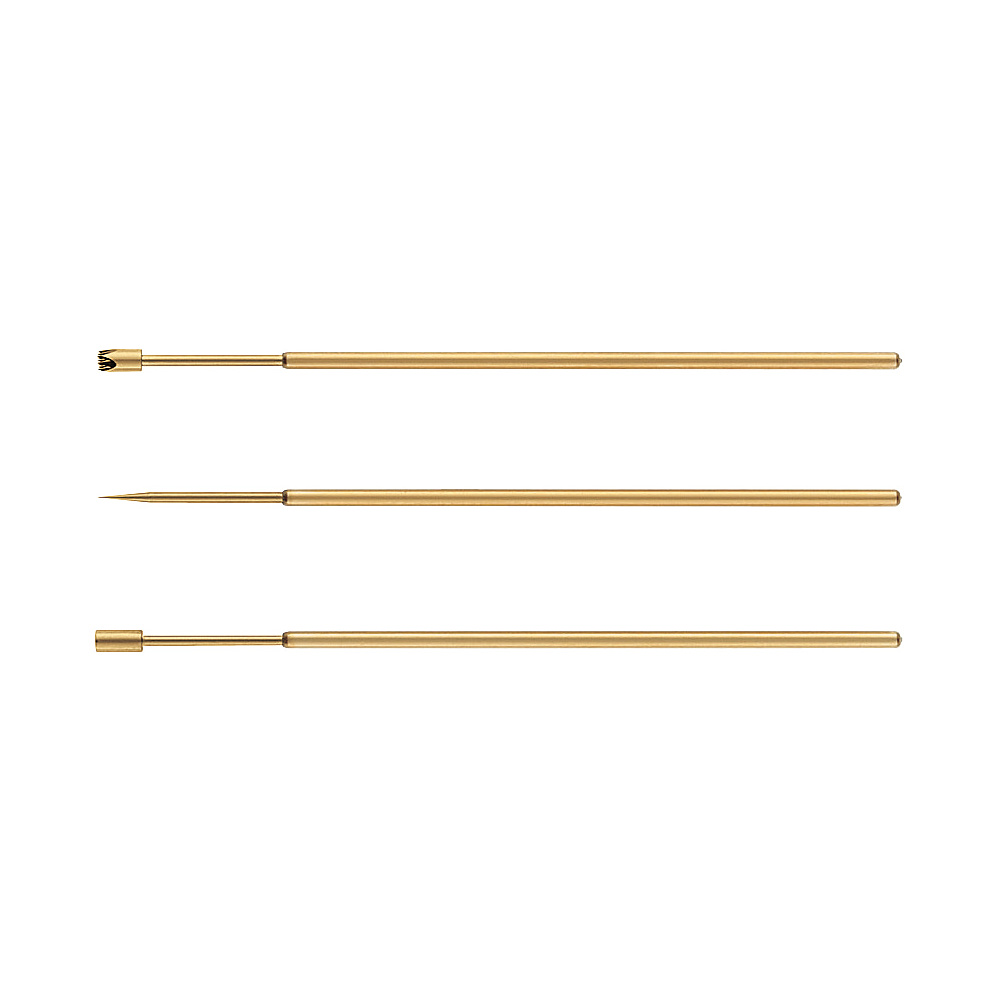

![]()
MISUMI Standard
![]()
Cheaper Price
![]()
Product Variety
![]()
3D CAD Support
Product Overview of Contact Probes
Contact Probes is a contact medium for electrical testing, and a high-end precision electronic hardware component.
It can be used to check the conductivity of all electronic circuits.
Product Feature of Contact Probes
Dimensional Drawing of Contact Probes
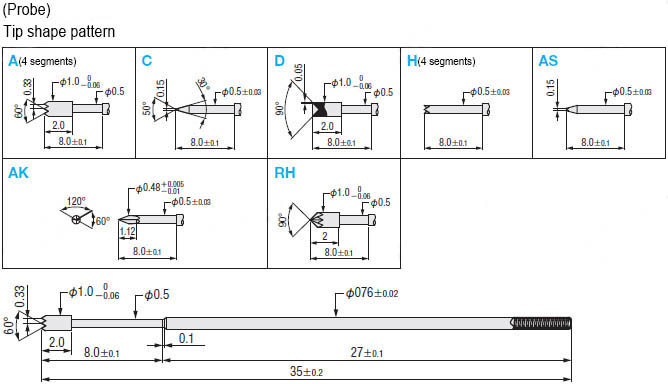
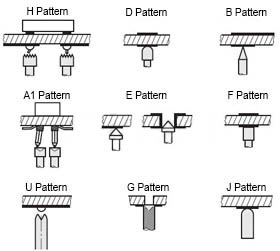
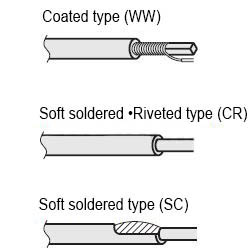
Example Use of Contact Probes

Precautions of Contact Probes
■General environmental conditions
· Operating ambient temperature is 10 to 40 ℃, humidity is 30% below
· Surrounding environment: An environment where there is no dust, corrosive gas, oil, etc. so that the Contact Probes is not polluted.
■Stroke condition
· Please apply axial load only, not transverse load.
· Exceeding the specified stroke (2/3 of the full stroke) will significantly reduce the life of the Contact Probes.
· The probe life may be shortened if moving at a speed of more than 60 times /min (constant speed).
■Current application condition
· Please apply current in a static state and in contact with the target contact within the specified stroke.
· The probe life may be significantly reduced if current is applied during operation within the specified stroke, outside the specified stroke, or without contact with the target contact (open circuit).
· The probe may not meet the maximum allowable current listed in the catalog due to aging and other reasons. Please design to ensure there is enough margin in actual use.
■Voltage application condition
· Please apply voltage in a static state and in contact with the target contact within the specified stroke.
· Do not apply voltage without contact with the target contact (open circuit). Otherwise, it will cause electric discharge when it is about to be touched, causing damage to the Contact Probes.
· When applying high voltage to the probe, please strictly observe the application conditions of current and voltage, and pay attention to avoid discharge phenomenon and instantaneous huge current generated during discharge.
■Maximum allowable current
· The maximum allowable current listed in the product catalog is the maximum value of continuous current flowing within 1 minute under the above-mentioned conditions (general environment, stroke, application of current and voltage).
■Contact resistance
· The resistance value listed in the product catalog refers to the representative value measured by applying a current of 10 mA to the probe and making it contact with the pure silver terminal under the above-mentioned conditions (general environment, stroke, application of current and voltage).
· If the flowing current is too large, the resistance may increase due to the internal aging of the contact or Contact Probes.
· After repeated operations within the specified stroke, the resistance may increase due to the aging of the contact or probe.
■Reference number of replacements
· The reference number of replacements listed in the product catalog refers to the reference number for probes that can be used normally when the current is 10mA under the above conditions (general environment, stroke, application of current and voltage).
· When the resistance increases or the spring pressure decreases due to the difference in the operating environment and conditions, the probe may need to be replaced before the reference number is reached. Please replace it in time according to actual usage.
■Spring pressure
· If the Contact Probes temperature exceeds 80 ℃, the spring pressure will drop.
· If the current value is increased, the spring pressure may drop due to the heating of the probe.
■Mounting hole size for press-fit (reference)
· Reference value only, depending on the material and thickness of the resin plate. Please design referring to the size of the probe holder press-fit part.
Usage Method of Contact Probes
Please select the product according to the mounting pitch (spacing) of the workpiece to be inspected.
Also, select the probe holder corresponding to the probe.
* The probe is different from the probe holder mounted directly on the resin plate, can be easily disassembled, saving time to replace the probe.
●About the use of the Contact Probes (probe holder)
① Insert the probe holder after opening holes on the resin plate (bakelite board, etc.). (See Diagram 1)
* For the opening size, please refer to the mounting hole size for press-fit as documented on each page. (See Diagram 2)
* If there is clearance between the resin plate and the probe holder, please fix it with adhesive before using it.
② After installation, wire to the probe holder.
* When soldering wires, please be careful not to let the flux flow into the probe holder. Otherwise, the probe may not work.
* Depending on the environment, if there is no space for soldering or wiring, please perform wiring before press-fit.
③ Insert the Contact Probes into the probe holder. (Refer to Diagram 1)
* At this time, if the tip (plunger) part is pressed down forcefully, it may cause damage or deterioration in function. Please be careful.
* Please use within the prescribed stroke (2/3 of the full stroke).
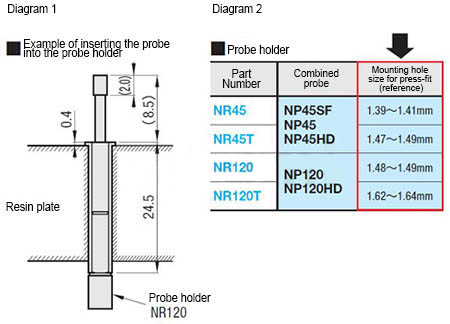
Related Products of Contact Probes
| MISUMI Contact Probes NP120 series matching probe holder product NR120 |
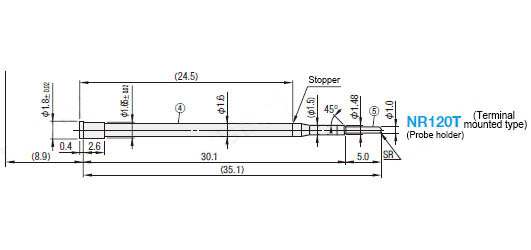 |
Specification Table of Contact Probes
| Part Number | - | Tip Shape | - | Lead Wire Color | - | Lead Wire Length |
| C‐NP76 | - | D |
■ Contact Probes
| Part Number | Mounting Pitch (min) | Full stroke | Spring pressure | Maximum Allowable Current | Resistance | Reference number of replacements | |
| Initial stage | 2/3 stroke | ||||||
| C‐NP76 | 1.27mm | 6.0mm | 60gf | 150gf | 3A | 60mΩ | 100,000 times |
Part Number
CAD Data download and 3D preview are not available because the part number has not yet been determined.
- *In order to open the CAD Data download and 3D preview screen, the part number must be fixed.
- Please confirm the part number from "Specification / Dimension"on the left side, and then perform the CAD Data Download / 3D Preview operation.
| Part Number |
|---|
| C-NP76-A |
| C-NP76-AK |
| C-NP76-AS |
| C-NP76-C |
| C-NP76-D |
| C-NP76-H |
| C-NP76-RH |
| Part Number | Standard Unit Price | Number of pc(s). included in pkg. | Minimum order quantity | Volume Discount | Days to Ship | Plunger O.D. (Ø) | Plunger Tip Shape |
|---|---|---|---|---|---|---|---|
411,974 IDR | 50 Pieces Per Package | 1 Pack(s) | Available | Same day | 1 | A Type | |
436,701 IDR | 50 Pieces Per Package | 1 Pack(s) | Available | 16 Day(s) | 0.5 | AK Type | |
412,029 IDR | 50 Pieces Per Package | 1 Pack(s) | Available | 16 Day(s) | 0.5 | AS Type | |
396,836 IDR | 50 Pieces Per Package | 1 Pack(s) | Available | Same day | 0.5 | C Type | |
396,894 IDR | 50 Pieces Per Package | 1 Pack(s) | Available | Same day | 1 | D Type | |
412,211 IDR | 50 Pieces Per Package | 1 Pack(s) | Available | Same day | 0.5 | H Type | |
436,761 IDR | 50 Pieces Per Package | 1 Pack(s) | Available | 16 Day(s) | 1 | RH Type |
Loading...
Basic Information
| Type | Contact Probe | Min. Mounting Pitch(mm) | 1.27 | Full Stroke (Range)(mm) | 5~6.5 |
|---|---|---|---|---|---|
| Full Stroke(mm) | 6.0 | 2/3 Stroke Spring Pressure (Range)(gf) | 100.1~150 | Plunger Material | C1730B |
| Plunger Surface Treatment | Gold Plating on Nickel Undercoat | Plunger Length L1 (Range)(mm) | 5.1~8 | Barrel, Receptacle Material | Phosphor Bronze |
| Barrel, Receptacle O.D.(Ø) | 0.76 | Barrel, Receptacle Length L2 (Range)(mm) | 25.1~30 | Properties | Standard |
| Initial Spring Pressure (Range)(gf) | 50.1~100 | Allowable Current(A) | 3 | Resistance(mΩ) | 60 |
| Plunger Length(mm) | 8.0 | Barrel, Receptacle Length(mm) | 27.0 | Initial Spring Pressure(gf) | 60 |
| 2/3 Stroke Spring Pressure(gf) | 150 |
- The specifications and dimensions of some parts may not be fully covered. For exact details, refer to manufacturer catalogs .
Frequently asked question (FAQ)
- Question: What are the operating environment conditions for probes?
- Answer: Ambient temperature is 10 to 40℃, humidity is below 30%, and there is no dust, corrosive gas, oil, etc., so that the probe is not polluted.
- Question: Does the center distance chosen for the probe refer to the center distance between two adjacent probes?
- Answer: Yes. If it is less than the minimum mounting pitch, the installation of two adjacent probes interferes with each other.
- Question: If I choose a non-lead type product, how to use it?
- Answer: The customer shall weld the wire by himself.


How can we improve?Bagaimana Kami bisa meningkatkan Pelayanan?
How can we improve?Bagaimana Kami bisa meningkatkan Pelayanan?
While we are not able to respond directly to comments submitted in this form, the information will be reviewed for future improvement.
Customer Privacy Policy Walaupun Kami tidak dapat langsung menjawab saran yang ditulis di lembar ini, informasinya akan kami review untuk peningkatan pelayanan dikemudian hari
Kebijakan Privacy
Thank you for your cooperation.Terima kasih atas kerjasama anda.
While we are not able to respond directly to comments submitted in this form, the information will be reviewed for future improvement.
Please use the inquiry form.
Customer Privacy Policy Walaupun Kami tidak dapat langsung menjawab saran yang ditulis di lembar ini, informasinya akan kami review untuk peningkatan pelayanan dikemudian hari
Silahkan pergunakan Forms Permintaan.
Kebijakan Privacy